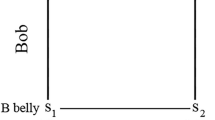Abstract
Sen's Liberal Paradox has received a good deal of attention in the literature. However, it is worth re-opening the discussion since the solutions offered so far have serious problems and since there is more to say about the nature of the problem displayed by the Liberal Paradox. I propose a new solution to the paradox in the following sense: First, I argue that its range of applicability is not very broad. Second, there is nothing paradoxical about a conflict of the principles involved in the Liberal Paradox. (Nagel's thesis of the ``fragmentation of value'' is important to make this point.) Third, I make a recommendation about how to remove conflicts when they occur in a restricted class of cases. For the other cases, no recommendation of similar appeal is available. But in the light of the first point, the availability of a generally applicable recommendation was not to be expected.
Similar content being viewed by others
REFERENCES
Arrow, K. (1951), Social Choice and Individual Values. Yale University Press, New Haven.
Barry, B. (1986), Lady Chatterley's Lover and Doctor Fischer's Bomb Party: Liberalism, Pareto Optimality, and the Problem of Objectionable Preferences, in: J. Elster and A. Hylland (eds.), Foundations of Social Choice Theory.
Dworkin, R. (1984), Rights as Trumps, in: J. Waldron (ed.), Theories of Rights. Oxford University Press, Oxford.
Fine, B. (1975), Individual Liberalism in a Paretian Society, Journal of Political Economy, 1277-1281.
Gärdenfors, P. (1981), Rights, Games, and Social Choices, Nous, Volume XV, No. 3.
Levi, I. (1992), Conflict and Inquiry, Ethics 102: 814-834.
Nagel, T. (1979), The Fragmentation of Value, in:Mortal Ouestions, pp. 128-141. Cambridge University Press, Cambridge.
Nozick, R. (1974), Anarchy, State, and Utopia. Blackwell, Oxford.
Pressler, J. (1990), The Flaws in Sen's Case Against Paretian Libertarianism, in: W. Sieg (ed.), Acting and Reflecting.
Seabright, P. (1989), Social Choice and Social Theories, Philosophy and Public Affairs 18: 365-387.
Sen, A. (1970a), The Impossibility of a Paretian Liberal, Journal of Political Economy 78: 365-387.
Sen, A. (1970b), Collective Choice and Social Welfare. North Holland, Amsterdam.
Sen, A. (1976), Liberty, Unanimity, and Rights, Economica 43: 217-245.
Sen, A. (1977), Social Choice Theory: A Re-Examination, Economica 45: 53-89.
Sen, A. (1983), Liberty and Social Choice, Journal of Philosophy 80: 5-18.
Sen, A. (1992),Minimal Liberty, Economica 59: 139-159.
Steiner, H. (1977), The Structure of a Set of Compossible Rights, Journal of Philosophy 74: 767-775.
Sugden, R. (1981), The Political Economy of Public Choice. Wiley, New York.
Sugden, R. (1985), Liberty, Preference, and Choice, Economics and Philosophy 1: 213-229.
Thomson, J.J. (1990), The Realm of Rights. Harvard University Press, Cambridge (Mass.).
Vallentyne, P. (1989), How to Combine Pareto Optimality with Liberty Considerations, Theory and Decision 27: 217-240.
Waldron, J. (1984), Introduction, in: J. Waldron (ed.), Theories of Rights. Oxford University Press, Oxford.
Waldron, J. (1991), Rights in Conflict, in: Liberal Rights, Cambridge University Press, Cambridge.
Williams, B. (1973), Ethical Consistency, in: Problems of the Self. Cambridge University Press, Cambridge.
Author information
Authors and Affiliations
Corresponding author
Rights and permissions
About this article
Cite this article
Risse, M. What to Make of the Liberal Paradox?. Theory and Decision 50, 169–196 (2001). https://doi.org/10.1023/A:1010301408403
Issue Date:
DOI: https://doi.org/10.1023/A:1010301408403




